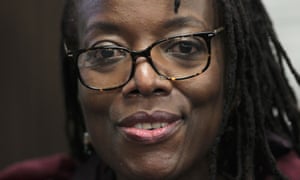Author of This Mournable Body detained as part of sweeping crackdown by security agencies
Source: Booker prize-longlisted author Tsitsi Dangarembga arrested in Zimbabwe | Books | The Guardian

Tsitsi Dangarembga, the award-winning Zimbabwean novelist who was nominated for the Booker prize longlist earlier this week, was arrested on Friday amid a sweeping crackdown by security agencies ahead of planned anti-corruption demonstrations.
Hundreds of police and soldiers remained on the streets of Harare, the capital, and others cities late into the evening, ordering inhabitants to go home and stay indoors.
Tensions have risen in the poor southern African country recently, as security agencies have sought to stifle widespread anger at soaring prices, inadequate public services and allegations of corruption at the highest levels of President Emmerson Mnangagwa’s government.
Harare’s usually bustling centre was virtually empty throughout the day. Helicopters flew low over poor neighbourhoods and the Guardian witnessed armed soldiers beating residents in one area in the west of the city.
On Thursday, police warned that anyone attending the protests would “only have themselves to blame” and government officials have described the protests, which have been banned under restrictions on social gatherings during the Covid-19 pandemic, as a “planned insurrection”.
Dangarembga, whose novel This Mournable Body was longlisted for the UK’s premier fiction award next to Hilary Mantel and Anne Tyler, documented her arrest in the city’s upscale suburb of Borrowdale on Twitter.
After protesting on social media about the arrest of journalists in Zimbabwe, she tweeted earlier today: “Friends, here is a principle. If you want your suffering to end, you have to act. Action comes from hope. This the principle of faith and action.”
One hour later, Dangarembga said she had been arrested. She continued to tweet after her arrest, saying that “it looks like it was a plainclothes job” before being released.
Dangaremba’s first novel, Nervous Conditions, is regarded as a modern classic.
The total number of arrests and detentions was unclear last night, though there were reports of dozens of opposition activists and journalists held in police cells.
Fadzayi Mahere, the spokesperson of the opposition Movement for Democratic Change (MDC), was detained on Friday, along with three party activists abducted and assaulted by unidentified men earlier this year.
The three women were travelling for routine bail reporting at Harare Central police station. They have been charged with fabricating their ordeal.
Earlier this week, police published a “wanted list” of 14 prominent critics of the government, including the trade unionist Peter Mutasa, the opposition legislator Job Sikhala, and two former youth leaders of the ruling Zanu-PF party.
A police spokesman described the security situation in the country as “calm and peaceful.”
“[We are] very concerned about reports of abductions, arrests and threats targeting those exercising constitutional rights. Freedom of expression is vital even in times of Covid-19, with social distancing observed,” tweeted the UK ambassador, Melanie Robinson.
Earlier this week, Zimbabwe’s ruling party threatened the US ambassador with expulsion, after calling the diplomat “a thug” who was fomenting unrest by funding protest organisers.
Similar accusations of foreign interference were systematically levelled for much of the rule of Robert Mugabe, the dictatorial former ruler who was ousted in a military takeover in 2017.
Mugabe’s fall raised fleeting hopes of reform and a potential diplomatic rehabilitation for the former British colony. Without better relations with the US, there is little hope of a desperately needed economic bailout for the heavily indebted state.
Clifford Hlatywayo, the deputy spokesperson of the MDC, said he was not surprised by the reaction of the authorities to the planned protest.
“We are not shocked by the reaction of the regime; it’s a testimony of a decayed system, which lives in panic and fears its own people,” Hlatywayo told the Guardian.
On Thursday, a court denied bail to the opposition politician Jacob Ngarivhume and journalist Hopewell Chin’ono, who has been an outspoken critic of corruption.
Chin’ono recently published documents raising concerns that powerful individuals in Zimbabwe were profiting from multimillion-dollar deals for essential supplies to fight the coronavirus pandemic.
The 49-year-old journalist is awaiting trial for incitement to public violence by promoting Friday’s protests.
Chin’ono and Ngarivhume, who faces similar charges, deny any wrongdoing and could face up to 10 years in prison if convicted.
Scores of people were killed during a crackdown on the last major protests in January 2019. Opponents say Mnangagwa is exploiting a Covid-19 lockdown to stifle dissent, after he imposed an overnight curfew and restricted free movement last week.
“People are living in fear of criticising the government. We have many grievances but can’t go out to protest because we will be beaten,” said Patrick Charinga as he filled petrol at a fuel station in Harare.
In one Harare neighbourhood, street vendors were dispersed by soldiers armed with AK47 rifles.
“The soldiers are coming”, shouted an elderly woman as residents fled an army truck.
One resident described “paralysing fear”. “You can see they are everywhere, if you dare go out you will be asking for trouble. We can never be afraid forever, one day we will have to rise up against this evil,” they said.
An economic crisis has been aggravated by the pandemic. Zimbabwe has reported nearly 3,000 confirmed cases of Covid-19 and 41 deaths, though most observers say official figures vastly underestimate the spread of the disease.
The United Nations World Food Programme (WFP) said on Thursday that by the year’s end, 8.6 million Zimbabweans – 60% of the population – will need aid to stave off malnutrition.
COMMENTS
Well done Zanu – shooting your self in the foot after poisoning Shiri it seems?